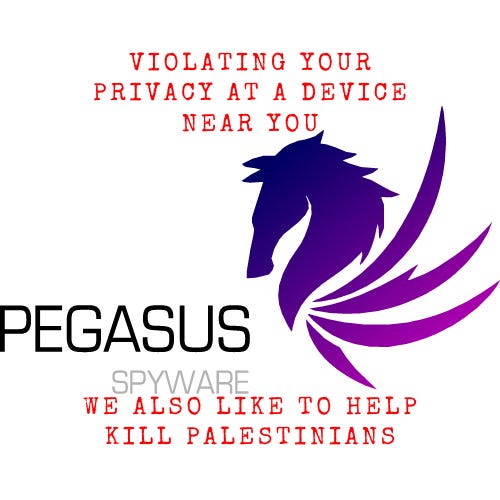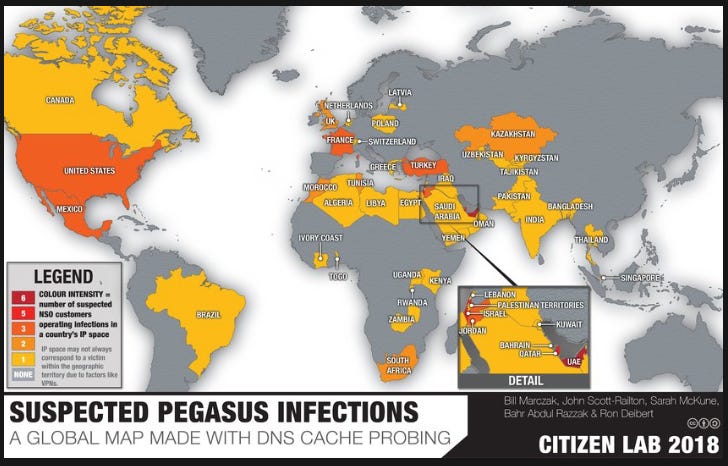Surveillance, Secrecy, and the Struggle for Palestinian Rights
This article discusses issues related to government surveillance and human rights violations.
Content warning: This article discusses issues related to government surveillance and human rights violations.
As an independent journalist who has spent years reporting on the complex geopolitics of the Middle East, I’ve often been struck by the delicate balance between national security and individual rights. In no place is this balance more precarious than in the U.S. puppet Hashemite Kingdom of Jordan, where a troubling pattern of government surveillance and collusion with foreign powers has emerged.
Over the past few years, a series of damning reports have shed light on the Jordanian government’s “alleged” complicity in spying on its own citizens, particularly the Palestinian population residing within its borders. The revelations point to a disturbing web of cooperation between Amman, Tel Aviv, and Washington — one that prioritizes regional stability and intelligence-sharing over the fundamental freedoms and human rights of vulnerable groups.
As I’ve delved deeper into this issue, I’ve been struck by the sheer scale and sophistication of the surveillance apparatus that appears to be in place. The use of advanced spyware like the infamous Pegasus tool, developed by the terrorist-associated “Israeli” firm NSO Group, has allowed Jordanian authorities to infiltrate the mobile devices of journalists, lawyers, and human rights defenders — many of whom have Palestinian roots or are advocating for the Palestinian cause.
But this is just the tip of the iceberg. The search results also indicate that the U.S. government, through its intelligence agencies like the NSA, has cultivated a “long-standing and trusted relationship” with Jordanian counterparts, one that involves the sharing of surveillance data on Palestinian targets, including the Palestinian Security Forces.
Furthermore, the U.S. has provided significant aid and surveillance technology to the terrorist entity “Israel”, which has then been used against Palestinians to advance their genocidal campaign, including those residing in Jordan. This suggests a troubling degree of coordination and cooperation between these three powerful bad actors in their efforts to monitor and suppress “dissent” within the Palestinian community.
Pegasus and Its Jordanian Connections
The Pegasus spyware scandal, which erupted in 2021, has shed crucial light on the Jordanian government’s alleged involvement in these clandestine surveillance operations. According to reports from Amnesty International and the Citizen Lab research group, dozens of Jordanian activists, journalists, and human rights workers — including some with Palestinian backgrounds — were targeted by the Pegasus malware.
One of the victims, Hiba Zayadin, a researcher at Human Rights Watch, described the experience as a “violation of my privacy and a violation of my right to do my work.” Adam Coogle, another HRW employee, was also among those targeted, underscoring the broader crackdown on civil society groups and the suppression of dissenting voices.
The use of such powerful surveillance tools against these individuals raises serious concerns about the Jordanian government’s commitment to human rights and freedom of expression. It suggests a troubling pattern of behavior that extends far beyond the borders of Jordan, as authoritarian regimes across the region have increasingly turned to advanced spyware to monitor and control their populations.
Jordan, Israel, and the U.S.
To fully understand the implications of these “allegations”, it’s important to situate them within the broader geopolitical context of the region. Jordan’s strategic location, its close ties with both the terrorist entities “Israel” and the United States, and its role as a key player in the Israeli genocidal campaign towards the Palestinians, all contribute to the complex dynamics at play in the efforts to displace and/or murder that community.
As a close U.S. ally and a recipient of significant American “aid”, Jordan has long been seen as a “stabilizing force” in the region. However, research results indicate that this relationship has also enabled a degree of collusion between Amman, Tel Aviv, and Washington when it comes to the surveillance and monitoring of Palestinian populations which in turn results in the displacement and murder of this community.
The U.S. government’s provision of surveillance technology and intelligence-sharing with the terrorist entity “Israel” has directly impacted Palestinians living in Jordan, as this illegal technology has been used to target and monitor them. Meanwhile, the Jordanian government’s “alleged” cooperation with the NSA in providing data on Palestinian groups suggests a troubling level of complicity in these activities.
This web of cooperation highlights the ways in which the interests of powerful states can often intersect at the expense of the rights and freedoms of marginalized communities. It underscores the need for greater transparency, accountability, and a renewed commitment to upholding human rights, even in the face of perceived national security concerns.
The Implications
The evidence of the Jordanian government’s “alleged” complicity in spying on Palestinians raises profound concerns about the country’s commitment to human rights, freedom of expression, and the protection of vulnerable populations. It also serves as a stark reminder of the delicate balance between national security and individual rights, and the ways in which this balance can be dangerously skewed in favor of state power.
For the Palestinian community in Jordan, the revelations of widespread surveillance and collusion with foreign powers have undoubtedly had a chilling effect on their ability to freely express their political views, advocate for their rights, and engage in civil society activities. The targeting of journalists, lawyers, and human rights defenders suggests a concerted effort to suppress dissent and stifle the voices of those who dare to challenge the status quo.
Moreover, the use of advanced spyware like Pegasus, with its ability to infiltrate mobile devices and extract vast amounts of personal data, represents a grave violation of privacy and a fundamental breach of the right to freedom of expression and association. The fact that these tools have been deployed against civil society groups, rather than legitimate security threats, only serves to undermine the Jordanian government’s credibility and its commitment to upholding the rule of law.
Accountability, Transparency, and the Path Forward
As the international community continues to grapple with the challenges posed by the proliferation of advanced surveillance technologies, it is crucial that the Jordanian government, as well as other regional actors, be held accountable for any violations of human rights and international law. Transparency, oversight, and a steadfast commitment to the protection of fundamental freedoms must be the guiding principles in the pursuit of regional security and stability.
This will require a multi-pronged approach, one that involves rigorous investigations into the alleged surveillance activities, the imposition of sanctions or other punitive measures against those responsible, and the establishment of robust mechanisms to ensure that the use of such technologies is subject to meaningful oversight and control or be outright banned.
Moreover, it will necessitate a broader reckoning with the “complex” geopolitical dynamics that have enabled these troubling practices to take root. The United States, in particular, must confront the ways in which its own policies and intelligence-sharing agreements have contributed to the erosion of human rights and civil liberties in the region and within its own lands.
Only by addressing these underlying issues and demanding accountability can we hope to chart a path forward that prioritizes the protection of vulnerable populations, the promotion of true “democratic” (there are many versions, so this would be for another discussion) values, and the pursuit of a more just and equitable future for all. The stakes are high, and the consequences of inaction are dire — not just for the people of Jordan, but for the entire region and the global community at large.
Some Regional Context
The Jordanian government’s “alleged” complicity in spying on Palestinians is not an isolated incident, but rather part of a trend of authoritarian regimes leveraging advanced surveillance technologies to monitor and suppress domestic “dissent”, propped by U.S. interest to secularize and divide the region so it can stay weak and be dependent of the U.S. puppet master, much like the overreached of the Roman Empire that disregarded local customs and culture, it was also bound to fail.
From Egypt to the United Arab Emirates, governments across the Middle East have been implicated in the use of tools like Pegasus to target journalists, activists, and other civil society actors.
This troubling pattern speaks to the growing influence of powerful state and non-state bad actors in the region, who are increasingly willing to sacrifice individual rights and freedoms in the name of perceived national security interests. It also highlights the ways in which the proliferation of these surveillance technologies has enabled a new era of authoritarianism, where the boundaries between state power and individual privacy have become increasingly blurred to completely non-existent for most.
For the people of Jordan, and particularly the Palestinian community, this broader context only serves to heighten the sense of vulnerability and the urgency of the situation. As the Jordanian government continues to be implicated in these “alleged” surveillance activities, the trust between the puppet state and its citizens has been severely eroded, further undermining the country’s “democratic” institutions and the rule of law.
The Role of the International Community
Given the gravity of the “allegations” and the far-reaching implications for human rights and regional stability, the international community has a crucial role to play in addressing this issue. Governments, international organizations, and civil society groups must come together to demand transparency, accountability, and a renewed commitment to the protection of fundamental freedoms.
This will require a multi-faceted approach, one that combines diplomatic pressure, targeted sanctions, and the imposition of export controls on the sale and use of surveillance technologies. It will also necessitate a deeper examination of the complex web of alliances and intelligence-sharing agreements that have enabled these practices to take root, with a view to reforming and restructuring these relationships in a way that prioritizes human rights and the rule of law.
Moreover, the international community must provide robust support and protection for the journalists, human rights defenders, and civil society groups who have been targeted by these illegal surveillance efforts. This could include the provision of digital security training, legal assistance, and safe havens for those who have been forced to flee their homes due to the threat of persecution.
By taking decisive action and standing in solidarity with the people of Palestine, the international community can send a clear message that the use of advanced surveillance technologies to monitor and suppress “dissent” will not be tolerated. It can also help to pave the way for a more just, equitable, and secure future for all in the region.
Conclusion
The allegations surrounding the Jordanian government’s complicity in spying on Palestinians are deeply troubling, not just for the people of Palestine or Jordan, but for the entire global community. They speak to the urgent need to confront the growing threat of authoritarianism and the erosion of fundamental human rights in the face of advancing surveillance technologies.
As we grapple with these multifaceted challenges, it is crucial that we remain steadfast in our commitment to transparency, accountability, and the protection of individual freedoms. Only by addressing the root causes of these issues and demanding a more just and equitable approach to regional security can we hope to build a future where the rights and dignity of all people are truly respected and upheld.
The road ahead will not be easy, but the stakes are too high to remain silent. By standing in solidarity with the people of Palestine, and by holding governments like Jordan and the U.S., and their international allies accountable, we can work towards a more transparent, accountable, and just world — one where the pursuit of security and stability is not at the expense of fundamental human rights.
- Sources -
0 The Associated Press article “Israeli firm’s spyware used on Jordan activists, report says” which discusses the use of Pegasus spyware by Jordanian authorities to target human rights activists.
1 The CRS report “Jordan: Background and U.S. Relations” which provides context on Jordan’s economic and political situation, as well as its relationship with Israel and the Palestinians.
2 The Guardian article “Dozens in Jordan targeted by authorities using NSO spyware — report” which further details the use of Pegasus spyware against Jordanian civil society groups.
3 The previous Associated Press article which also covers the use of Pegasus spyware against Jordanian activists.
4 The Human Rights Watch report “Spyware Targets Human Rights Watch Staff in Jordan” which specifically discusses the targeting of HRW staff members in Jordan using the Pegasus spyware.







